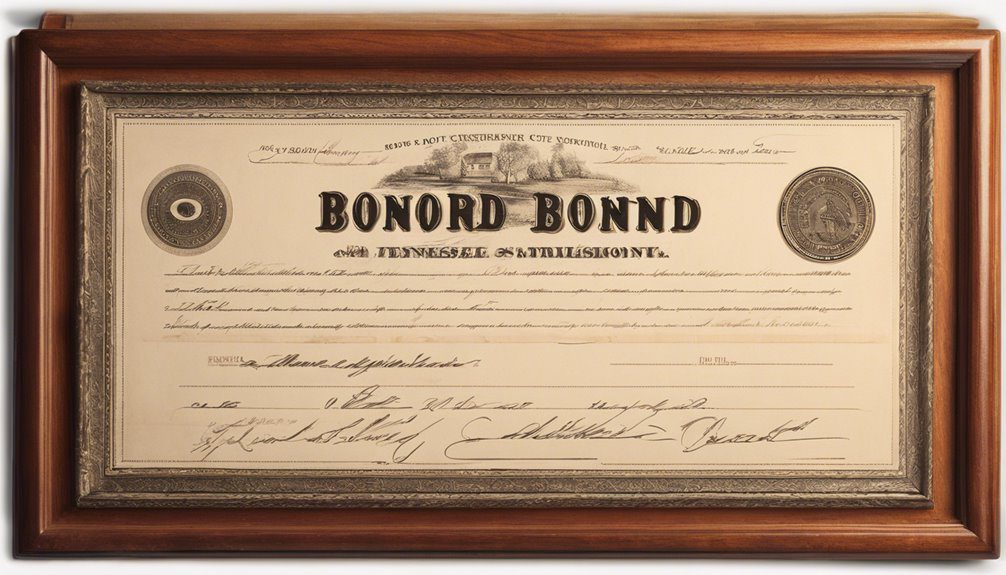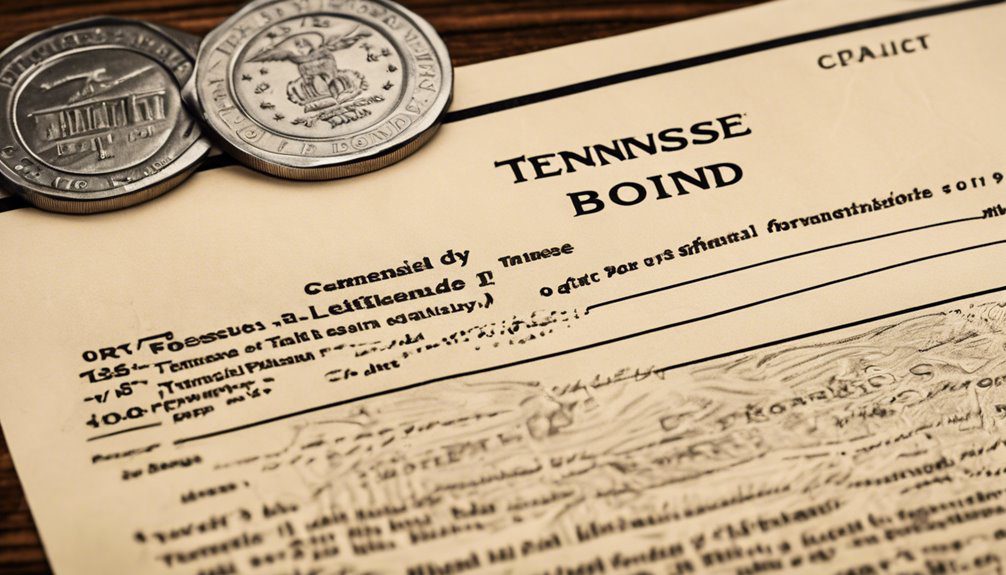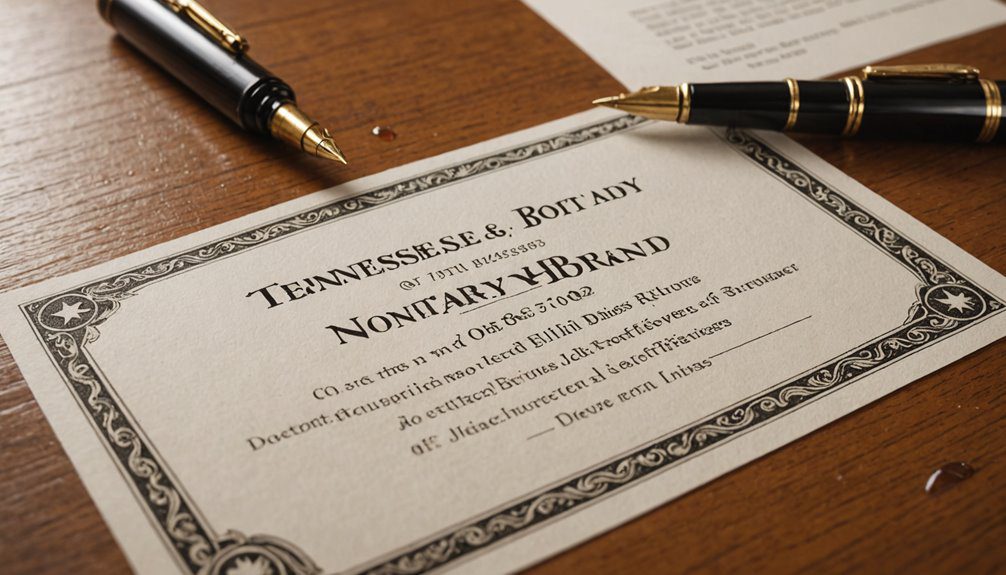When you're stepping into the role of a notary in Tennessee, understanding the nuances of the notary bond and the optional Errors and Omissions (E&O) bond is crucial. The notary bond is a legal requirement designed to protect the public, but adding an E&O bond can significantly enhance your professional standing. It's not just about compliance; it's about building trust with your clients. So, what exactly sets these bonds apart, and how can you ensure you're fully protected in your notarial duties? The answers might surprise you.
What Is a Notary Bond?

A notary bond serves as a crucial safeguard in the realm of notary services, ensuring trust and accountability.
Essentially, it's a three-party agreement involving you, the state, and a surety company. When you become a notary, you'll need to secure this bond, which guarantees that you'll perform your duties honestly and ethically.
If you fail to uphold these duties, the bond provides a level of financial protection for the public. This means that if you commit a wrongful act or negligence while notarizing documents, affected parties can file a claim against your bond for compensation.
It's not just a formality; it's a legal requirement in many states, including Tennessee.
Importance of Notary Bonds
Notary bonds play a vital role in maintaining the integrity of notarial services. When you act as a notary, you're entrusted with significant responsibilities, and a bond protects both you and the public. It ensures that you'll perform your duties honestly and accurately.
If any errors or misconduct occur while you're notarizing documents, the bond provides a financial safety net for those affected.
Having a notary bond boosts your credibility. Clients feel more secure knowing there's a bond in place, which can enhance your reputation and help you attract more business. It shows you're serious about your role and committed to following the law.
Moreover, notary bonds are often required by state regulations. If you want to operate legally, you'll likely need one to obtain your notary commission.
Not only does this keep you compliant, but it also demonstrates your professional integrity. Additionally, having a notary bond provides financial protection for clients in cases of errors or misconduct, ensuring their interests are safeguarded.
Understanding E&O Bonds

While notary bonds protect against misconduct and errors, E&O (Errors and Omissions) bonds offer an additional layer of security for notaries. These bonds specifically cover mistakes or negligence you might make while performing your duties as a notary. For example, if you accidentally misinterpret a document or fail to properly administer an oath, an E&O bond can help cover the financial losses incurred by the affected parties.
Having an E&O bond isn't just about protecting yourself; it also enhances your credibility as a notary. Clients are more likely to trust you when they know you have this extra layer of protection in place. It shows that you take your responsibilities seriously and are prepared to stand behind your work. Additionally, obtaining an E&O bond demonstrates your commitment to transparency and accountability, which is essential in building strong client relationships.
It's important to understand that E&O bonds typically have limits on coverage, so you should choose a bond amount that reflects your risk exposure. The cost of E&O bonds varies based on factors like your location and professional experience, but the peace of mind they provide is invaluable.
In the end, investing in an E&O bond can safeguard your career and help you serve your clients with confidence.
Differences Between Notary and E&O Bonds
Understanding the differences between notary bonds and E&O bonds is crucial for anyone in the notary profession. A notary bond primarily protects the public from any mistakes or misconduct you might commit while performing notarial duties. If you fail to fulfill your responsibilities, the bond provides financial compensation to affected parties, thereby safeguarding public trust in the notary system.
On the other hand, an E&O (Errors and Omissions) bond is designed to cover potential claims arising from negligence or errors in your professional services.
While a notary bond is mandatory in many states, an E&O bond is often optional but highly recommended. It offers an extra layer of protection for you, covering legal fees and damages if someone claims you made a mistake during a transaction.
How to Obtain a Notary Bond

Obtaining a notary bond is a straightforward process that's essential for anyone looking to become a notary.
First, you'll need to decide on the bond amount required by your state, as Tennessee typically mandates a $10,000 bond.
Next, you can choose a bonding company that's licensed in Tennessee. Many insurance agents or online providers offer notary bonds.
Once you've selected a provider, you'll complete a simple application. This usually requires providing personal information, such as your name, address, and any previous notary experience.
After you submit your application, the bonding company will assess your eligibility. Most applicants are approved quickly, often within the same day.
Upon approval, you'll receive your notary bond certificate. You'll also need to pay the required premium, which is typically affordable and often ranges from $50 to $100, depending on the provider.
After obtaining your bond, make sure to file it with the appropriate state office, along with your notary application, to complete the process.
With your bond in hand, you're one step closer to starting your journey as a notary in Tennessee!
How to Secure an E&O Bond
Once you've secured your notary bond, the next step is to consider obtaining Errors and Omissions (E&O) insurance. This coverage protects you from claims of negligence or mistakes in your notarial duties.
To secure an E&O bond, start by researching different insurance providers that offer this type of coverage. Many providers specialize in notary insurance and can provide tailored options suited to your needs.
Next, gather the necessary information about your notary business, including how long you've been in practice and the types of services you offer. This will help insurers assess your risk level.
Once you've identified a few potential providers, request quotes to compare coverage options and premiums.
After reviewing the quotes, choose the policy that best fits your needs and budget. Be sure to read the terms carefully, as coverage limits and exclusions may vary.
Finally, fill out the application and provide any required documentation. Once approved, you'll receive your E&O bond, giving you peace of mind as you fulfill your responsibilities as a notary public. Additionally, obtaining an E&O bond enhances your credibility and client trust, similar to how financial advisor bonds serve to protect clients from misconduct.
Costs Associated With Bonds

When it comes to securing your Tennessee notary bond, it's essential to consider the various costs involved. First, you'll need to pay the premium for the bond itself. This amount typically ranges from $50 to a few hundred dollars, depending on the bond amount and your credit history.
If you have a good credit score, you might find lower premiums, while a poor score could lead to higher costs.
Additionally, if you choose to secure an Errors and Omissions (E&O) bond, you'll need to factor in that expense too. E&O insurance generally costs around $100 to $300 per year, based on your coverage limits.
Don't forget about potential fees charged by the bonding company. Some might've application fees or other administrative costs that can add up.
Lastly, remember that these bonds are typically valid for a specific period, often four years, meaning you'll need to budget for renewal as well. Non-compliance can lead to indefinite license suspension, emphasizing the importance of maintaining your bond throughout its validity.
Renewal and Maintenance of Bonds
Renewing and maintaining your Tennessee notary bond is crucial for ensuring you stay compliant and protected. The bond typically needs renewal every four years, so it's essential to keep track of your expiration date. You'll receive a notification from your bonding company, but it's wise to set reminders for yourself.
To renew your bond, you'll need to pay the renewal premium, which can vary based on your provider. After payment, your bonding company will issue a new bond certificate. Make sure to keep a copy of this document for your records and provide it to the Secretary of State if required.
It's also a good idea to review your Errors and Omissions (E&O) insurance coverage during the renewal process. Ensure you're adequately protected against potential claims arising from your notarial acts. If your needs have changed, you might want to adjust your coverage accordingly.
Regularly reviewing and maintaining your bond and E&O insurance not only safeguards you but also reinforces your credibility as a notary. Staying proactive will help you avoid any lapses that could jeopardize your notary commission.
Conclusion
In summary, obtaining a Tennessee notary bond, along with an optional E&O bond, is crucial for protecting both you and your clients. Not only does the notary bond fulfill legal requirements, but the E&O bond enhances your credibility and demonstrates your commitment to professionalism. By securing these bonds, you're not just complying with state regulations—you're also safeguarding yourself against potential financial losses and building trust with those you serve.


